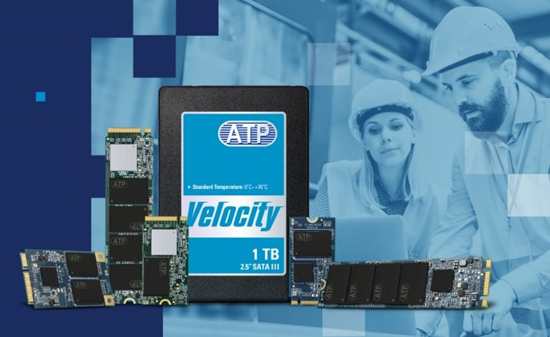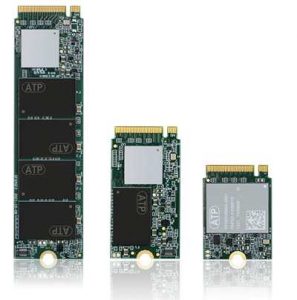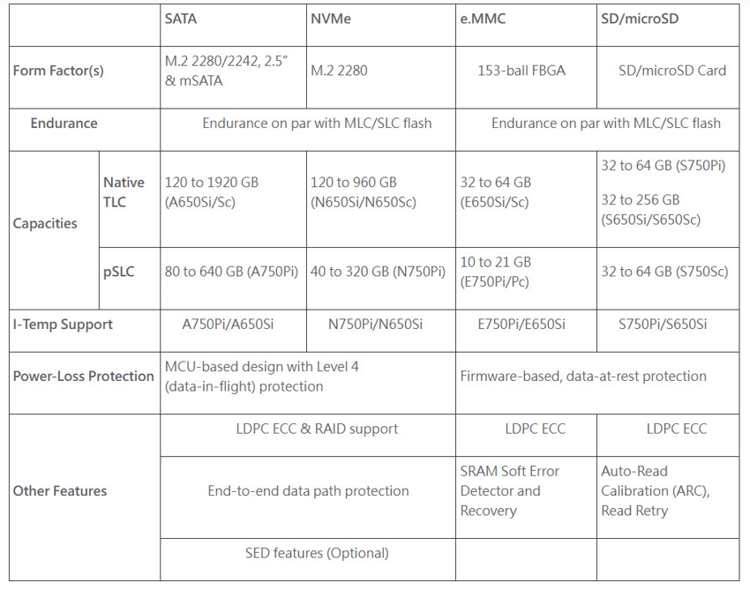Embedded World: ATP Exhibits industrial DDR5 Memory Modules, NVMe SSDs With PCIe Generation 4.0 x4 Lanes and High-Endurance Memory Cards
With upcoming NVMe M.2 2280 and U.2 SSDs built on over 100 layers of 3D TLC NAND with PCIe Gen. 4.0 interface
This is a Press Release edited by StorageNewsletter.com on June 20, 2022 at 2:02 pmATP Electronics, Inc. will showcase its latest offerings and customizable solutions aimed at meeting application requirements at Embedded World 2022, Nuremberg Exhibition Center, Germany, from June 21 to 23, 2022.
Partners and visitors can expect to see the company’s industrial DDR5 memory modules, NVMe SSDs with PCIe Generation 4.0 x4 lanes, as well as customizable thermal and high-endurance solutions at Embedded World’s first live exhibit after two years.
DDR5, NVMe PCIe 4.0: Generation of speed, reliability and efficiency
The firm’s DDR5 memory modules are expected to deliver performance and reliability improvements over the previous generation, especially for critical computing applications. DDR5 offers twice the speed, 4 times the capacity, and greater power efficiency over its previous generation.
Upcoming NVMe M.2 2280 and U.2 SSDs built on over 100 layers of 3D TLC NAND will have the PCIe Gen. 4.0 interface, which doubles the PCIe 3.0 data transfer rate from 8GT/s per lane to 16GT/s per lane. Using 4 PCIe lanes, the SSDs will operate at a maximum theoretical transfer rate of 64GT/s, compared with 32GT/s via PCIe 3.0. With this significant bandwidth increase, PCIe Gen. 4.0 x4 SSDs enable faster data transmission and lower latency.
Solutions for challenges
The company is capable of addressing any variety of embedded/industrial usage cases through specialized configurations that support memory and storage requirements. To highlight this capability, the firm is exhibiting products that demonstrate the following pillars of customization.
Thermal. The company offers customizable thermal solutions for NVMe Gen. 3 and Gen. 4 M.2 and U.2 SSDs that combine ATP-built hardware and firmware, as well as simulation and testing systems. Depending on customer and application criteria, as well as available space within host systems, the firm can offer copper foil and 4 or 8 mm fin-type heatsink to dissipate heat. The Dynamic Thermal Throttling mechanism is a firmware-based mechanism that prevents extreme temperature increase by continuously detecting device temperature.
Endurance. SATA and NVMe SSDs manufactured using a new die package break 3D TLC endurance limits. A750Pi /N750Pi Series are configured as full-drive pSLC, achieving near-SLC levels with at least 50% higher endurance. A650Si/Sc and N650Si/Sc Series SSDs in native TLC, meanwhile, have 66% higher endurance that reaches near-MLC levels.
Likewise, the e.MMC E750Pi/Pc Series is built with 3D TLC NAND flash but configured as pSLC to offer endurance on par with SLC, while E650Si/Sc Series in native TLC has near-MLC endurance. For customers looking for e.MMC size flexibility, ATP offers customizable package solutions in sizes such as 9x10mm and 11.5x13mm.
Also, watch out for high-endurance SD/micro SD card offerings built for dashcams and digital video recorders (DVRs), offering up to 109,401 hours of continuous video recording, to be launched soon!
Following table provides summary of key features:
Security
Also taking the spotlight in Embedded World 2022 are security solutions. Customizable SecurStor microSD cards come with integrated features that provide data-at-rest protection, as well as a wide range of optional custom features tailored to an application’s individual requirements. SecurBoot ensures the integrity and validity of the stored system’s BIOS configuration, while SecurEncrypt protects the User Data area with hardware AES-256 XTS encryption, the highest level of hardware encryption without performance trade-off.
The company SecurStor microSD cards are available in MLC NAND flash and are officially recommended as boot device for the Raspberry Pi OS (formerly, Raspbian).

















 Subscribe to our free daily newsletter
Subscribe to our free daily newsletter

